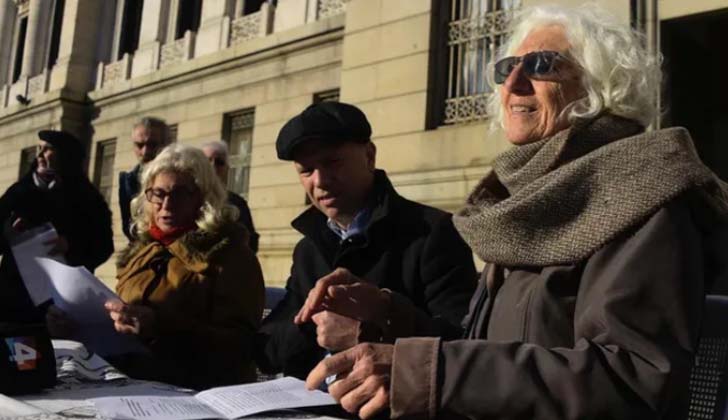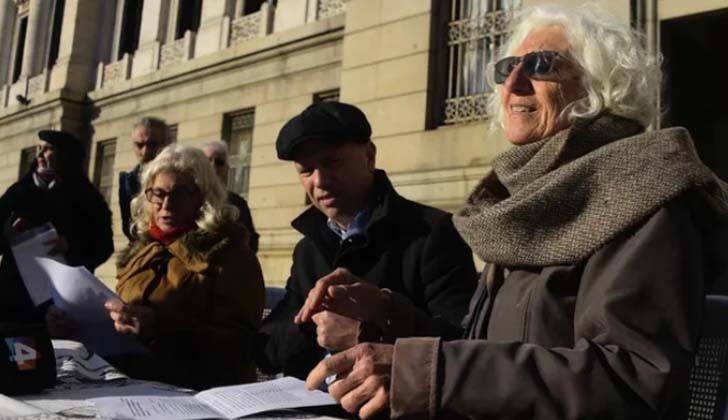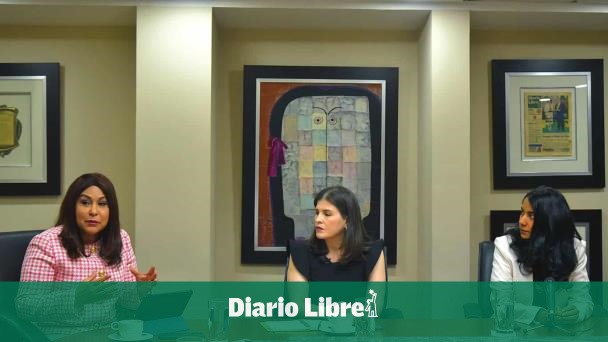
This Monday, August 1, the General Assembly of Parliament meets with the task of proceeding to the election of the members of the Board of Directors of the National Institution of Human Rights and Ombudsman, according to article 37 of Law No. 18,446, of 2008 (in this case the third Board of Directors since the INDHH) since it was created.
At a time when the parliamentary session was beginning, more than 20 social organizations, linked to the greatest diversity of human rights, with activity deployed throughout the country, held a rally on the esplanade of the Legislative Palace to express their disagreement with the “distribution of positions between government and opposition”, and because “the admissibility requirements were not controlled, acting outside the Law and outside the Paris Principles that govern the INDDHH.
Within the framework of the concentration, the Organization of Mothers and Relatives of Uruguayan Detainees and Disappeared proceeded to read a statement through which they state that the more than 20 social organizations have proposed to articulate to guarantee a democratic, transparent process adjusted to the Law in the election of a new Board of Directors of the National Institution of Human Rights and Ombudsman’s Office.
They clarified that they have also proposed to work to “achieve a greater participation of social organizations in regard to the tasks and activities of the Institution.”
“When we talk about the Institution we refer to the body for the defense, protection and promotion of all human rights of all people throughout the territory, and we talk about the control that this Institution makes so that the State does not violate those rights”, it is indicated in the declaration.
They recall that it is about 10 years of “contribution to the strengthening of the democratic system and a creation law that was voted unanimously.”
distribution of charges
The signatory organizations of the declaration recall that one of the strengths of the INDDHH, recognized as such by the international organization responsible for qualifying the democratic quality of the “ombudsman” or ombudsman, is their autonomy. “Autonomy and independence from the government in office and from the political parties”. They add that this autonomy, which also supports the moral authority of its observations and resolutions, “is what is at risk.”
“That is what we came to denounce and what we are We propose to initiate legal action. We are going to exercise our rights. We are going to defend the National Institution for Human Rights and the Ombudsman’s Office”, assure the organizations.
They denounce that the INDDHH “has been receiving strong attacks for a long time”, in particular through statements from referents of different political parties, in particular from sectors that make up the government coalition from Cabildo Abierto.
“It was said that a Human Rights Institution is not needed, just as it was said that the Law had to be changed because it got involved in issues that did not correspond to it. And they insisted on defining the election of the new Board of Directors as a distribution of positions between the government and the opposition”, the signatory organizations detail.
They also question that “in great detail it has even been pointed out” how the distribution would be within the government coalition itself.
“The distribution of positions as political loot is a huge aggression.” Harming the autonomy of the INDDHH is distorting it, taking away an essential part. As serious as taking away the function of controlling the State. Within the framework of this election process, the attacks go beyond words and are specified in resolutions of the Special Parliamentary Commission, charged by law, with receiving the applications and sending the list of those candidates who meet the requirements to the General Assembly. the law requires.
The Special Commission “did not act as required by law, because it accepted applications made by legislators, when it should only have accepted those applications made by social organizations registered with the INDDHH,” they denounce.
Likewise, they denounce that he did not control all the admissibility requirements that the Law imposes to be a candidate, such as, for example, that of “having experience and well-known knowledge in the matter of rights”, consequently resolving to send all the names proposed to the General Assembly. , except for those that present incompatibilities, all of this, “outside the Law and outside the Paris Principles, which are those that guide and support the Human Rights Institutions and the Ombudsman’s Offices.”
Nullity
For this reason, the organizations that signed the declaration refer to “illegalities” and announced “legal actions that allow the process to be as it should be.”
In this sense, the more than 20 social and human rights organizations announced that they will promote the “annulment of these resolutions of the Special Commission before the Contentious-Administrative Court and the suspension of the election process until the Court resolves the substantive issue.”
“Parliament can go back, review the resolutions questioned, act in accordance with the Law and thus avoid prosecuting its actions. Now appointing a Board of Directors on which it will be judged whether its members were well elected does not do the people involved any good, it does no good for the Human Rights Institution whose authority, as we said before, rests not only on the Law but in the unquestionability of its authorities. In short, it does not do democracy any good.”
They add: “We don’t even want to think about what will happen with each observation and resolution made by the Institution if later the Court agrees with us and states that the election process was not adjusted to the law and those who were elected should not have been.”
The social organizations warn of the irregularities, as at the time they also pointed out that applications had been accepted from organizations that “were not authorized to do so because they were not registered in the Institution’s registry.”
They demand “transparency because not all the information available on the candidates was made public.”
They question that “there may have been some arrogance on the part of some legislators by ignoring the contribution that was proposed from the social organizations in this process”.
“What we insistently alert from the organizations was also pointed out by a UN working group that made ‘a call to the members of the bicameral commission and the General Assembly to guarantee that the election of the Board of Directors does not affect the independence of the Institution or hinder its search for disappeared persons. In particular, with regard to independence’, a concern based on the ‘intention of certain political sectors of the country to want to control and politicize the Institution through the election of a new Board of Directors’”.
For this reason, social organizations will promote a nullity action before the Contentious-Administrative Court. They assure that they will not renounce any other action within the current legal framework to defend the INDDHH, to which people can turn when they find their rights violated by the action or omission of the State.
Signatory Organizations:
Mothers and Relatives of Uruguayans Detained and Disappeared
Inter-union Plenary of Workers – National Convention of Workers (PIT CNT)
Peace and Justice Service (Serpaj) – Uruguay
Friends of the Earth Networks – Uruguay
National Movement of Public and Private Health Users (MNUSPP)
Black Sheep Collective
Round Trips
Uruguayan Federation of Housing Cooperatives for Mutual Aid (FUCVAM)
Fearless Women – Minas, Lavalleja
Center for Archives and Access to Public Information (CAinfo)
Mental Health and Human Rights Cooperative (COSAMEDDHH)
Civil Association Life and Education
Center for the Promotion and Defense of Human Rights (CDH)
Uruguayan Association of Gerontological Entertainers and Assistants (AUDAAG)
Association of Cannabis Growers of Uruguay (ACCA)
Coordinator for the Withdrawal of Troops from Haiti
Tacuabe Chasqui Oyendau
Single Union of Rice and Allied Workers (SUTAA)
Memories of the Coast
Civil Association Ágora de Canelones
Human Rights Secretary of the PIT CNT
Collective for Memory, Truth and Justice of Tacuarembó (Interiors in Network)
Memory in Freedom – Boys, Girls and Adolescents, victims of State terrorism
Memory, Justice and Against Impunity Commission – Soriano (Interiors in Network)
Commission for the Memory of the Soca Fusiles
Working Group for Truth and Justice of Bella Unión (Interiors in Network)
Solidarity Group to Redouble
Council of the Charrúa Nation
Charrúa Oipik Udimar
April Girls Memory Commission
Freedom Penal Memorial Space
Juan Lacaze Human Rights Collective







